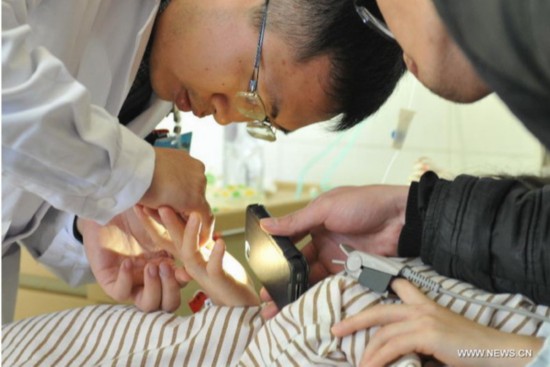


A doctor removes glass from a victim's hand who is injured of a bus fire at the No.1 Hospital in Xiamen, East China's Fujian province, Jan 15, 2015.(Photo/ Xinhua)
Patients will not face higher medical expenses after hospitals adjust their service charges this year in line with a major reform plan, a top health official said on Friday.
"We will ensure that the adjustment of medical service prices will not impose a burden on people through measures such as increasing medical insurance payments for bills," said Sun Zhigang, vice-minister in charge of the National Health and Family Planning Commission.
All county-level public hospitals, which cover more than 900 million people, will stop the practice of selling drugs at prices up to 15 percent higher than they pay to buy them from pharmaceutical companies, according to a guideline issued by the State Council this month.
The income from drug sales is an important source of revenue for public hospitals.
After the reforms come into force, the hospitals' only sources of income will be the service fees they receive for treating patients and government subsidies.
"Hospitals' revenues will decrease because of the loss of income from drug sales," said Sun. "The loss will be made up in a number of other ways, including adjustments to charges for medical services, increased subsidies and reductions in operating costs."
Charges that are likely to rise include clinic and treatment fees, surgery fees and nursing fees, while bills for checkups involving the use of large equipment will be reduced, Sun said.
Public hospitals in 311 counties stopped selling drugs at higher prices in 2012 as part of a pilot program, Sun added. The reforms will be expanded to all county-level hospitals and public hospitals in 100 cities at prefecture level or above this year, according to the commission.
"The core target of the reform of public hospitals is to maintain and strengthen their nonprofit nature so they provide fair and accessible services to everyone," said Liu Yuanli, dean of the Public Health School at Peking Union Medical College.
Rao Keqin, a professor at the Chinese Medical Association, said subsidies account for only 8 percent of the total revenues of public hospitals, and a lack of government support has prompted many hospitals to increase drug prices.
Liu said the slowdown in economic growth means it is imperative that governments at various levels honor their duty to invest in public hospitals so they run smoothly despite the loss of income from drug sales.
 J-11 fighters in air exercise
J-11 fighters in air exercise Beauties dancing on the rings
Beauties dancing on the rings Attendants-to-be join Mr. & Miss Campus Contest
Attendants-to-be join Mr. & Miss Campus Contest Beijing's toughest anti-smoking law takes effect
Beijing's toughest anti-smoking law takes effect Family lives in cave for about 50 years in SW China
Family lives in cave for about 50 years in SW China PLA soldiers operating vehicle-mounted guns in drill
PLA soldiers operating vehicle-mounted guns in drill Blind carpenter in E China's Jiangxi
Blind carpenter in E China's Jiangxi China hosts overseas disaster relief exercise for the first time
China hosts overseas disaster relief exercise for the first time 20 pairs of twins who will become flight attendants in Sichuan
20 pairs of twins who will become flight attendants in Sichuan Obama is sowing discontent in S.China Sea
Obama is sowing discontent in S.China Sea Rescuers work through night to reach cruise ship survivors
Rescuers work through night to reach cruise ship survivors Driving through limbo
Driving through limbo Facing down MERS
Facing down MERSDay|Week